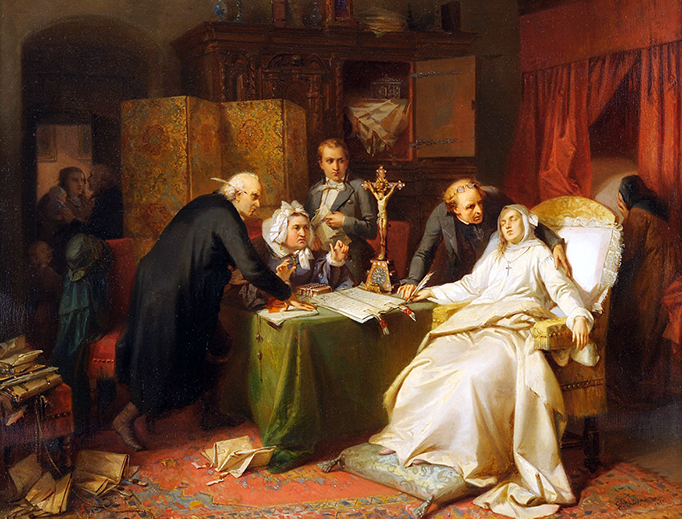Famous Last Words of Famous People
“The Christian who unites his own death to that of Jesus views it as a step towards him and an entrance into everlasting life.” (CCC 1020)

When musician and television star David Cassidy died of organ failure on Nov. 21, Americans of a certain age remembered him as a teen idol. In the 1970s, Cassidy's role as Keith Partridge on the musical sitcom The Partridge Family and his bubblegum pop music (“I Think I Love You”) brought him into living rooms across America.
Regret and Humility
But despite his lucrative and highly successful career, Cassidy seemed less than satisfied with his life. The star's droll last words – according to his daughter Katie Cassidy – were “So much wasted time.”
That someone on the brink of eternity might have regrets is not surprising. It's a great reminder, though, when we're tempted to focus on the here-and-now, on acquiring wealth or prestige or just the latest fidget-spinner.
David Cassidy is not the only famous figure whose last words attest to his introspection and remorse.
Leonardo da Vinci, acclaimed as one of the greatest artists of the Renaissance, was deeply humble as he prepared to leave this earth. “I have offended God and mankind,” he said, “because my work did not reach the quality it should have.”
Sir Isaac Newton, the British physicist and mathematician who formulated the laws of motion and of gravity, was similarly humble as his life slipped away. ““I don’t know what I may seem to the world,” he said.
“...But as to myself I seem to have been only like a boy playing on the seashore and diverting myself now and then in finding a smoother pebble or a prettier shell than the ordinary, whilst the great ocean of truth lay all undiscovered before me.”
A Glimpse of Heavenly Bliss
Another Italian Renaissance painter, the noted Raphael, perhaps caught a glimpse of heaven as he said goodbye to this earth. Cardinal Bibbiena, a close friend of Raphael's who had subsidized the artist's work, reported to his niece that as Raphael neared the moment of death, he awoke, looked around, and asked, “Whence comes the sunshine?” And then, ignoring the friends gathered at his bedside, the artist said simply, “Happy....” With that, he died.
Another happy exit was seemingly enjoyed by inventor Thomas Edison. His last words, spoken to his wife as he emerged from a coma, were “It is very beautiful out there.” Some believe he was speaking about the view outside his window; others acknowledge that he may have caught a glimpse of what lies beyond.
And in the modern age, Apple founder Steve Jobs, whose death of cancer at the age of 56 rocked Silicon Valley and the business world, seemed on his deathbed to gaze on a world of unimaginable bliss. Mona Simpson, novelist and college professor, was Jobs' sister. At his funeral, Simpson delivered a eulogy in which she described the scene at her brother's deathbed. According to the Telegraph,
She said Jobs looked at her, then his children, then his wife and then beyond them all, saying: “Oh wow. Oh wow. Oh wow.”
A Catholic View of Death
All of us, too, will face that moment when our earthly life ends, and when we step into eternity – to spend our days either in the joy of Christ's presence, or in the terror and pain of separation from Him for all time. If we are honest, we will experience both the regret that David Cassidy exhibited, and the humble acknowledgment of God's greatness and our ordinariness. But if heaven is our next home, we may also pass to eternal life with the joy and excitement like Raphael, like Edison, like Steve Jobs.
The Catechism of the Catholic Church (1020) explains the great mystery of death, and explains how the Sacrament of Anointing and Holy Viaticum, the food for the journey, offers comfort at the moment of death:
The Christian who unites his own death to that of Jesus views it as a step towards him and an entrance into everlasting life. When the Church for the last time speaks Christ's words of pardon and absolution over the dying Christian, seals him for the last time with a strengthening anointing, and gives him Christ in viaticum as nourishment for the journey, she speaks with gentle assurance:
Go forth, Christian soul, from this world....
May you return to [your Creator]
who formed you from the dust of the earth.
May holy Mary, the angels, and all the saints
come to meet you as you go forth from this life....
May you see your Redeemer face to face.













